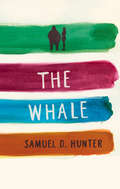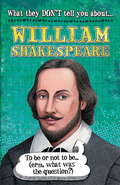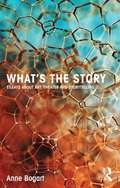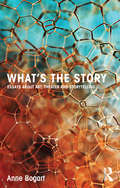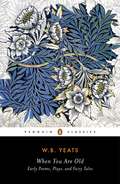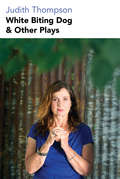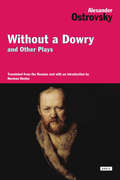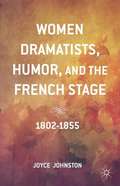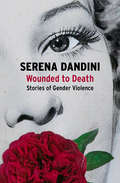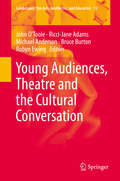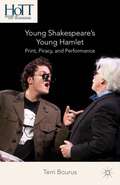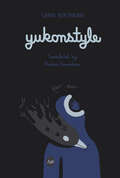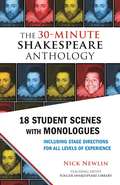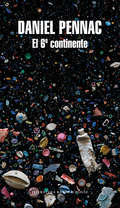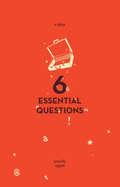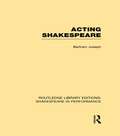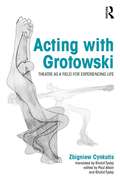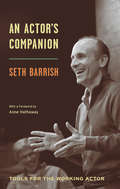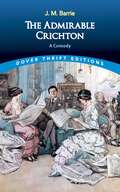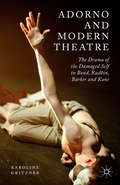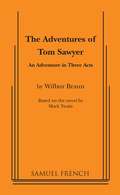- Table View
- List View
The Whale / A Bright New Boise
by Samuel D. HunterAcclaimed for his gentle, complex characterizations, Hunter's big-hearted, fiercely funny plays explore the quiet desperation running through many Middle American lives: The Whale tells the story of a man's last chance at redemption and of discovering beauty in the most unexpected places, and A Bright New Boise is a philosophical investigation of faith and search for meaning in rural Idaho.
What They Don't Tell You About: William Shakespeare
by Anita GaneriDid you know that Shakespeare couldn't spell his own surname? Love him or hate him, everyone has heard of the world's most famous playwright. But did the Elizabethans think he was a genius or simply that he wrote great soap operas? Any book on Shakespeare will give you the boring facts THEY think you should know, but only this one will tell you what the bard and his mates were REALLY like ... Uncover a wealth of information about Shakespeare! Find out where he was born and look at his family tree, see a map of Shakespeare's Stratford and Shakespeare's London, find out what school was like in Shakespeare's time, what London life was like and what sort of people went to the theatre. See a cross-section illustration of the Globe and discover how special effects were created and what actors wore. Read biographies of famous actors of the era such as Edward Alleyn, Richard Burbage, Richard Tarlton and William Kempe as well as biographies of contemporary writers Ben Jonson, Thomas Kyd and Christopher Marlowe. Read famous quotes and sayings and whizz your eye over a timeline of Shakespeare's plays and of his life. This book will tell you what Shakespeare's longest or shortest play is, or even which is the most miserable or goriest? It includes plots and information about ten of Shakespeare's plays: Richard III; Romeo and Juliet; A Midsummer Night's Dream; The Merchant of Venice; Henry V; Twelfth Night; Hamlet; Othello; Macbeth and The Tempest. It highlights some of Shakespeare's funniest characters and some of those that were in love. It concludes looking at how Shakespeare died, and discusses whether Shakespeare was, in fact, Sir Francis Bacon, Edward De Vere, Roger Manners, William Stanley or Christopher Marlowe. Finally, test your knowledge of all you've read with a fun 20-question quiz.
What's The Story: Essays About Art, Theater And Storytelling
by Anne BogartAnne Bogart is an award-winning theatre maker, and a best-selling writer of books about theatre, art, and cultural politics. In this her latest collection of essays she explores the story-telling impulse, and asks how she, as a ‘product of postmodernism’, can reconnect to the primal act of making meaning and telling stories. She also asks how theatre practitioners can think of themselves not as stagers of plays but ‘orchestrators of social interactions’ and participants in an on-going dialogue about the future.
What's the Story: Essays about art, theater and storytelling
by Anne BogartAnne Bogart is an award-winning theatre maker, and a best-selling writer of books about theatre, art, and cultural politics. In this her latest collection of essays she explores the story-telling impulse, and asks how she, as a ‘product of postmodernism’, can reconnect to the primal act of making meaning and telling stories. She also asks how theatre practitioners can think of themselves not as stagers of plays but ‘orchestrators of social interactions’ and participants in an on-going dialogue about the future. We dream. And then occasionally we attempt to share our dreams with others. In recounting our dreams we try to construct a narrative... We also make stories out of our daytime existence. The human brain is a narrative creating machine that takes whatever happens and imposes chronology, meaning, cause and effect... We choose. We can choose to relate to our circumstances with bitterness or with openness. The stories that we tell determine nothing less than personal destiny. (From the introduction) This compelling new book is characteristically made up of chapters with one-word titles: Spaciousness, Narrative, Heat, Limits, Error, Politics, Arrest, Empathy, Opposition, Collaboration and Sustenance. In addition to dipping into neuroscience, performance theory and sociology, Bogart also recounts vivid stories from her own life. But as neuroscience indicates, the event of remembering what happened is in fact the creation of something new.
When You Are Old: Early Poems, Plays, and Fairy Tales
by William Butler Yeats Rob DoggettRecalling Yeats's 1890s fascination in aestheticism and the arts and crafts movement, selections will draw from the first published versions of poems from works such as Crossways, The Rose, The Wind Among the Reeds, In the Seven Woods, The Green Helmet and Other Poems, Responsibilities, The Wild Swans at Coole, and Michael Robartes and the Dancer. A selection Irish myths and fairytales including "The Wanderings of Oisin," a Celtic fable and his first major poem, represent his fascination with mysticism, spiritualism and the rich and imaginative heritage of his native land.
White Biting Dog and Other Plays
by Judith ThompsonThis book collects some of Judith Thompson’s earlier, hard-to-find plays, including White Biting Dog, a poetic black comedy about a divorced lawyer who prepares to kill himself by jumping off the Bloor Street Viaduct—until he encounters a small dog who sets him on a different path; I Am Yours, a harrowing story about a group of characters on the brink of despair as each tries to escape what haunts them the most; and Pink, a moving monologue set in 1970s South Africa that centres on a young girl’s surprising reaction after her nanny is murdered during a protest.
Why Theatre Matters
by Kathleen GallagherWhat makes young people care about themselves, others, their communities, and their futures? In Why Theatre Matters, Kathleen Gallagher uses the drama classroom as a window into the daily challenges of marginalized youth in Toronto, Boston, Taipei, and Lucknow. An ethnographic study which mixes quantitative and qualitative methodology in an international multi-site project, Why Theatre Matters ties together the issues of urban and arts education through the lens of student engagement. Gallagher's research presents a framework for understanding student involvement at school in the context of students' families and communities, as well as changing social, political, and economic realities around the world.Taking the reader into the classroom through the voices of the students themselves, Gallagher illustrates how creative expression through theatre can act as a rehearsal space for real, material struggles and for democratic participation. Why Theatre Matters is an invigorating challenge to the myths that surround urban youth and an impressive study of theatre's transformative potential.
William Shakespeare (What They Don't Tell You About #29)
by Anita GaneriDid you know that Shakespeare couldn't spell his own surname?Love him or hate him, everyone has heard of the world's most famous playwright. But did the Elizabethans think he was a genius or simply that he wrote great soap operas? Any book on Shakespeare will give you the boring facts THEY think you should know, but only this one will tell you what the bard and his mates were REALLY like ...Uncover a wealth of information about Shakespeare! Find out where he was born and look at his family tree, see a map of Shakespeare's Stratford and Shakespeare's London, find out what school was like in Shakespeare's time, what London life was like and what sort of people went to the theatre. See a cross-section illustration of the Globe and discover how special effects were created and what actors wore. Read biographies of famous actors of the era such as Edward Alleyn, Richard Burbage, Richard Tarlton and William Kempe as well as biographies of contemporary writers Ben Jonson, Thomas Kyd and Christopher Marlowe. Read famous quotes and sayings and whizz your eye over a timeline of Shakespeare's plays and of his life.This book will tell you what Shakespeare's longest or shortest play is, or even which is the most miserable or goriest? It includes plots and information about ten of Shakespeare's plays: Richard III; Romeo and Juliet; A Midsummer Night's Dream; The Merchant of Venice; Henry V; Twelfth Night; Hamlet; Othello; Macbeth and The Tempest. It highlights some of Shakespeare's funniest characters and some of those that were in love.It concludes looking at how Shakespeare died, and discusses whether Shakespeare was, in fact, Sir Francis Bacon, Edward De Vere, Roger Manners, William Stanley or Christopher Marlowe.Finally, test your knowledge of all you've read with a fun 20-question quiz.
Without a Dowry and Other Plays
by Alexander OstrovskyOne of the most important Russian playwrights of the nineteenth century, Alexander Ostrovsky (1823-1886) is credited with bringing realism to the Russian stage. Contemporary of Turgenev, Dostoevsky, and Tolstoy and precursor to Chekhov, he was a keen sociological observer, often exposing abuses of power, landing him in trouble with the censors again and again. He wrote 47 original plays and began the tradition of acting today associated with Stanislavsky. Ostrovsky’s plays were written with performance in mind and with a masterful use of colloquial language. To this day they are a much-performed part of the Russian repertory. This volume collects four of Ostrovsky’s key plays, each from a different decade-A Profitable Position, An Ardent Heart, Without a Dowry, and Talents and Admirers, and is rounded out by the translator’s introduction, an afterword for each play, an extensive bibliography, and complete list of Ostrovsky’s works. .
Women and Shakespeare in the Eighteenth Century
by Fiona RitchieFiona Ritchie analyses the significant role played by women in the construction of Shakespeare's reputation which took place in the eighteenth century. The period's perception of Shakespeare as unlearned allowed many women to identify with him and in doing so they seized an opportunity to enter public life by writing about and performing his works. Actresses (such as Hannah Pritchard, Kitty Clive, Susannah Cibber, Dorothy Jordan and Sarah Siddons), female playgoers (including the Shakespeare Ladies Club) and women critics (like Charlotte Lennox, Elizabeth Montagu, Elizabeth Griffith and Elizabeth Inchbald), had a profound effect on Shakespeare's reception. Interdisciplinary in approach and employing a broad range of sources, this book's analysis of criticism, performance and audience response shows that in constructing Shakespeare's significance for themselves and for society, women were instrumental in the establishment of Shakespeare at the forefront of English literature, theatre, culture and society in the eighteenth century and beyond.
Women Dramatists, Humor, and the French Stage
by Joyce JohnstonFilling a critical void, this book examines French women dramatists of the nineteenth century who managed to have their works staged prior to the lifting of censorship laws in 1864. Sophie de Bawr (1773 1860), Sophie Gay (1776 1852), Virginie Ancelot (1792 1875), and Delphine Gay de Girardin (1804 1855) all staged successful plays at Paris's top venues (Theatre Francais and Odeon) or at other selective theatres (Ambigu-Comique, Vaudeville, Gymnase) during this period without the aid or protection of a male coauthor. Between 1802 and 1855, all four of these dramatists were heavily involved in the literary scene of their day and hosted their own salons, venues essential for any male author wishing to see his works published and accepted among the public. While not always directly engaged in the politics of the day in their theater, these dramatists were aware of and influenced by the public sphere. Though none staged what today's critics would refer to as overtly feminist drama, through their use of humor, Bawr, Gay, Ancelot, and Girardin all cast aspersion upon patriarchal dominance and reconstructed ideals of womanhood that rejected traditional submissive roles. "
The World of Tacitus' Dialogus de Oratoribus
by Christopher S. van den BergComing to terms with the rhetorical arts of antiquity necessarily illuminates our own ideas of public discourse and the habits of speech to which they have led. Tacitus wrote the Dialogus at a time (ca. 100 CE) when intense scrutiny of the history, the definitions, and the immediate relevance of public speech were all being challenged and refashioned by a host of vibrant intellects and ambitious practitioners. This book challenges the notion that Tacitus sought to explain the decline of oratory under the Principate. Rather, from examination of the dynamics of argument in the dialogue and the underlying literary traditions there emerges a sophisticated consideration of eloquentia in the Roman Empire. Tacitus emulates Cicero's legacy and challenges his position at the top of Rome's oratorical canon. He further shows that eloquentia is a means by which to compete with the power of the Principate.
Wounded to Death
by Serena DandiniThe voices too many women have lost; the dreams too many men have destroyed In these monologues originally written for theatrical performance, women who were victims of murder regain their voices to tell their truths. One woman, her body unceremoniously dumped in a well by her husband, laments the police force's halfhearted investigation of her murder. Another, forced to toil ceaselessly for a meager few euros per month, grows weary of enduring daily beatings and attempted rape and hangs herself from a crystal chandelier. Inspired by true events, these monologues represent what the victims of femicide might say, had they not been robbed of their voices. First staged as a play in 2012 in Palermo, Italy, Wounded to Death has taken Italy and the world by storm. Alongside the powerfully imagined speeches in this edition, Serena Dandini presents the grim global statistics of violence against women. This essential book showcases the author's exceptional capacity for creating nuanced emotion, from comic to painful, from grotesque to dramatic. With a factual basis and cinematic flair, these works compel the reader to consider the violence that is taking place right now all over the world.
Young Audiences, Theatre and the Cultural Conversation
by John O'Toole Ricci-Jane Adams Michael Anderson Bruce Burton Robyn EwingThis volume offers rare insights into the connection between young audiences and the performing arts. Based on studies of adolescent and post-adolescent audiences, ages 14 to 25, the book examines to what extent they are part of our society's cultural conversation. It studies how these young people read and understand theatrical performance. It looks at what the educational components in their theatre literacy are, and what they make of the whole social event of theatre. It studies their views on the relationship between what they themselves decide and what others decide for them. The book uses qualitative and quantitative data collected in a six-year study carried out in the three largest Australian States, thirteen major performing arts companies, including the Sydney Opera House, three state theatre companies and three funding organisations. The book's perspectives are derived from world-wide literature and company practices and its significance and ramifications are international. The book is written to be engaging and accessible to theatre professionals and lay readers interested in theatre, as well as scholars and researchers. "This extraordinary book thoroughly explains why young people (ages 14-25+) do and do not attend theatre into adulthood by delineating how three inter-linked factors (literacy, confidence, and etiquette) influence their decisions. Given that theatre happens inside spectators' minds, the authors balance the theatre equation by focusing upon young spectators and thereby dispel numerous beliefs held by theatre artists and educators. Each clearly written chapter engages readers with astute insights and compelling examples of pertinent responses from young people, teachers, and theatre professionals. To stem the tide of decreasing theatre attendance, this highly useful book offers pragmatic strategies for artistic, educational, and marketing directors, as well as national theatre organizations and arts councils around the world. I have no doubt that its brilliantly conceived research, conducted across multiple contexts in Australia, will make a significant and original contribution to the profession of theatre on an international scale. " Jeanne Klein, University of Kansas, USA "Young Audiences, Theatre and the Cultural Conversation is a compelling and comprehensive study on attitudes and habits of youth theatre audiences by leading international scholars in the field. This benchmark study offers unique insights by and for theatre makers and administrators, theatre educators and researchers, schools, parents, teachers, students, audience members of all ages. A key strength within the book centers on the emphasis of the participant voices, particularly the voices of the youth. Youth voices, along with those of teachers and theatre artists, position the extensive field research front and center. " George Belliveau, The University of British Columbia, Canada
Young Shakespeare’s Young Hamlet
by Terri BourusOne of the most vexing textual, theatrical, and interpretive puzzles in Shakespeare studies is the existence of three different versions of Hamlet. In this groundbreaking work, Shakespeare scholar Terri Bourus argues that this puzzle can only be solved by drawing on multiple kinds of evidence and analysis, including history of the book, theatre history, biography, performance studies, and close readings of textual variants. Combining the history of print culture with practical theatrical experience and special attention to Hamlet's women, Bourus presents here a case study of the "dramatic intersections" between Shakespeare's literary and theatrical working practices. In the process, she reshapes our assumptions about the beginning of Shakespeare's career and his artistic evolution.
Yukonstyle
by Sarah Berthiaume Nadine DesrochersGarin was two years old when his mother disappeared from a run-down East Vancouver neighbourhood. And now that the Robert Pickton trials are gaining national attention, Garin wonders if his mother, a First Nations woman, could be one of the unidentified victims. His ailing father isn't forthcoming with answers, and Garin's suspicions are at an all-time high. In the midst of all this, his roommate Yuko has taken in Kate, a young pregnant hitchhiker who unintentionally wreaks havoc on their friendship. But when Garin's father is hospitalized, nothing else matters but finally determining the truth about his mother. In this deftly written play, the characters grapple with the harsh Yukon winter within a world of racism, addiction, and loneliness.
The 30-Minute Shakespeare Anthology: 18 Student Scenes with Monologues
by Nick Newlin William ShakespeareDrawing on his eighteen years of experience as a teaching artist for Folger Shakespeare Library, Nick Newlin offers eighteen scenes to get young actors on their feet performing Shakespeare with confidence, understanding, and fun!Each scene averages five minutes in length, containing two to six characters, and features a monologue that young performers can use in performance, audition, or competition. Every scene has been "road tested" by one of Newlin's student groups at the Folger's annual Secondary School Shakespeare Festival, and includes dynamic stage directions and incisive performance notes to help teachers and students bring Shakespeare's plays to life.The 30-Minute Shakespeare Anthology includes one scene and monologue from eighteen of Shakespeare's greatest plays, including Romeo and Juliet, Macbeth, Hamlet, Othello, A Midsummer Night's Dream, Julius Caesar, Much Ado About Nothing, As You Like It, The Merchant of Venice, and The Taming of the Shrew.Additionally, the anthology contains a scene and monologue from Henry IV Part I, King Lear, As You Like It, The Comedy of Errors, The Tempest, Twelfth Night, The Merry Wives of Windsor, and Love's Labor's Lost.Also featured is an essay by editor Nick Newlin on how to produce a Shakespeare play with novice actors, and notes about the original production of this abridgment at the Folger Shakespeare Library's annual Student Shakespeare Festival. Each scene and monologue has accompanying notes and performance suggestions.
El 6º continente: Precedido de Ex enfermo de los hospitales de París
by Daniel Pennac¿Cómo diablos puede convertirse una familia obsesionada con la limpieza en la fuente de polución más horrenda de la historia de la humanidad? Esta es la incógnita que se resuelve en El 6º continente, la obra teatral creada a partir de las innumerables improvisaciones de un grupo de actores bajo las órdenes de la directora francesa Lilo Baur. Estrenada en el teatro parisino Bouffes du Nord, este drama familiar-planetario es a su vez una ópera bufa que, ante el inevitable desastre ecológico que vaticinan sus páginas, no deja otra salida al espectador (y al lector) que la risa. Precede a esta pieza teatral el monólogo Ex paciente de los hospitales de París, en el que un médico residente de un hospital público de París relata una larga y accidentada noche de guardia, una noche en la que encontró la fe, la perdió, la reencontró y la extravió de nuevo. Con su habitual y aguda ironía, y echando mano del lenguaje escénico, Daniel Pennac nos enfrenta con la realidad de una sociedad posmoderna llena de excesos, inconsciente y egoísta, cuyos integrantes desestabilizan un sistema sanitario precario y un equilibro medioambiental ya prácticamente inexistente. Reseñas:«Divertida, conmovedora, lúcida y bromista.»Le quotidien du médecin «Divertidísimo.»Marie France «El estilo ligero y audaz de Pennac nos ofrece una pléyade de situaciones cómicas y toda una legión de personajes estrafalarios. Es divertida, uno se ríe, pero la melancolía y el cinismo, siempre presentes en Pennac, no pierden su lugar, y provocan de manera imperceptible que el lector ahonde en sus reflexiones y emociones más sombrías.»Le souffleur
6 Essential Questions
by Priscila Uppal6 Essential Questions tells the story of Renata as she travels to Brazil to reunite with the mother who abandoned her when she was just five years old. In Rio, Renata discovers more than she bargained for in her quest to uncover the truth of who abandoned whom. She is continually tossed about by her undead grandmother and a semi-invisible uncle as they choreograph the ultimate dance of mother and daughter, both of whom must confront their dreams before they can ever attempt to confront each other. Imaginations run wild in this strangely beautiful and funny story loosely based on Uppal’s critically acclaimed memoir, Projection: Encounters with My Runaway Mother, a finalist for both the Hilary Weston Writers’ Trust Prize for Nonfiction and the Governor General’s Literary Award for Non-Fiction.
Acting Shakespeare (Routledge Library Editions: Shakespeare in Performance)
by Bertram Leon JosephHow did the actors for whom Shakespeare wrote his plays make his characters come to life, how did they convey his words? Can modern directors, actors, and even library readers of Shakespeare learn from them? Creating character and making the Elizabethan playwright’s poetry compelling for the audience is a problem which has seldom been resolved in modern times. This book demonstrates the hard course a modern actor must follow to make real and truthful the words he speaks, and the action and emotion underlying them. With examples and simple exercises, this book helps with the preparation for the great task – providing the actor with a combination that unlocks the Bard's English. Starting with how theatrical speech was understood in Renaissance England, it looks at figures of speech, the powers of persuasion, and the passion and rhythm inherent in the language.
Acting with Grotowski: Theatre as a Field for Experiencing Life
by Zbigniew Cynkutis‘Zbigniew Cynkutis’ writings constitute invaluable testimony of his work with Jerzy Grotowski during the ‘theatre of productions’ phase and beyond. Cynkutis’ insights elucidate aspects of the Laboratory Theatre’s praxis and provide a unique perspective on the questions most often asked about Grotowski. Authored by one of the Laboratory Theatre’s most accomplished actors, this book draws on long-term theatre research and deep knowledge of the craft of acting to offer practical advice indispensable to the professional and aspiring actor alike. The volume offers the English-speaking reader an unprecedented richness of primary source material, which sheds new light on the practical work of one of the most influential theatre directors of the 20th century. Cynkutis’ voice is sincere and direct, and will continue to inspire new generations of theatre practitioners.’ – Dominika Laster, Yale University Acting with Grotowski: Theatre as a Field for Experiencing Life explores the actor-director dynamic through the experience of Zbigniew Cynkutis, one of Polish director Jerzy Grotowski’s foremost collaborators. Cynkutis’s work as an actor, combined with his later work as a director and theatre manager, gave him a visionary overview based on precise embodied understanding. Cynkutis’s writings yield numerous insights into the commitment needed to make innovative, challenging theatre. A central component of Acting with Grotowski is his distinctive approach to training: ‘Conversations with the Body’ includes a range of techniques and approaches to warming up, rehearsing and creating work from a physical starting point, beautifully illustrated by Bill Ireland. The book comprises reflections and practical suggestions on a range of subjects – theatre and culture, improvisation, ethics, group dynamics, and Cynkutis’s vision for the Wrocław Second Studio. It contains visual and textual materials from Cynkutis’s own private archive, such as diary entries and letters. Acting with Grotowski demonstrates the thin line that separates life and art when an artist works with extreme commitment in testing political and social conditions.
An Actor's Companion
by Seth Barrish Anne Hathaway"I was totally unprepared for the transformation that Seth's technique created in me. . . . I realized that what I thought I knew about acting up to that point was largely misguided . . . but I now had a great, talented, dedicated teacher who generously wanted to share his tools with everyone. There is muscularity, not to mention wisdom and truth to Seth's techniques. He is a wonderful teacher, and I know that having him as my first guide is one of the luckiest things to have happened to me in my career and life. And when I can't get back to class with him, I am so grateful I have this book to turn to."--Anne Hathaway"This book is truly unlike anything else I know--these pieces are haikus on specific elements of performance and character building."--Philip Himberg, executive director, Sundance Theatre InstituteA collection of practical acting tips, tools, and exercises, An Actor's Companion is ideal for both the seasoned professionals and actors-in-training. The tips--all simple, direct, and useful--are easy to understand and even easier to apply, in both rehearsal and in performance.Seth Barrish is an actor, teacher, and the co-artistic director of The Barrow Group in New York City. In his thirty-year career, he has directed the award-winning shows My Girlfriend's Boyfriend (Lucille Lortel Award for Best Solo Show, Drama Desk and Outer Critics Circle nominations for Best Solo Show), Sleepwalk With Me (Nightlife Award for Outstanding Comedian in a Major Performance), The Tricky Part (Obie Award, Drama Desk nominations for Best Play and Best Solo Show), Pentecost (Drama Desk nomination for Best Play), Old Wicked Songs (Los Angeles Drama Critics Circle Award and Garland Award for Best Direction), and Good (Straw Hat Award for Best Direction), among dozens of others.
The Admirable Crichton: A Comedy (Dover Thrift Editions)
by J. M. BarrieOnce a month, Lord Loam encourages his servants to enter the drawing room for tea. This ritual defiance of tradition disturbs Crichton, the butler, who regards the class system as "the natural outcome of a civilized society." When the entire household is shipwrecked and stranded on a desert island, a new social order emerges - with comic results for master and servant. This classic English comedy, written by the author of Peter Pan, combines light entertainment with serious undertones concerning the class structure of British society during the early twentieth century. First produced in 1902, the play was adapted for radio and television and has been frequently revived on the stage.
Adorno and Modern Theatre: The Drama of the Damaged Self in Bond, Rudkin, Barker and Kane
by K. GritznerAdorno and Modern Theatre explores the drama of Edward Bond, David Rudkin, Howard Barker and Sarah Kane in the context of the work of leading philosopher Theodor W. Adorno (1903-1969). The book engages with key principles of Adorno's aesthetic theory and cultural critique and examines their influence on a generation of seminal post-war dramatists.
Adventures of Tom Sawyer
by Mark TwainAdventure in three acts based on the novel by Mark Twain. Great for young audiences.
